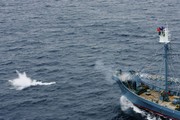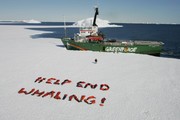EUROPEAN CETACEAN BYCATCH CAMPAIGN
"Man is but a strand in the complex web of life"
"Man is but a strand in the complex web of life"
Greenpeace tells companies behind whale hunt that whaling is bad for business
Greenpeace
3rd February 2006
Upon returning to Cape Town after a 73-
Speaking at a Press conference on board the Greenpeace's ship Esperanza, which along with Arctic Sunrise, has dogged, delayed and disrupted the whaling fleet, expedition leader Shane Rattenbury said: "We have defended whales from the harpoon in one of the most inhospitable places on earth, the Southern Ocean, but the campaign is far from over. To end whaling the campaign must now go from the high seas to the high street. It must go from the lobby corridors of the International Whaling Commission to the board rooms of the companies who trade in whales."
Greenpeace is focussing its corporate campaign on the companies behind Kyodo Senpaku, which owns and operates the whaling fleet. In response to a letter from Greenpeace, Nissui -
Already, a popular Argentine seafood company Pesquera Santa Elena has cancelled contracts with Nissui because of its links to whaling. There, a Greenpeace internet campaign resulted in over 21,000 'cyberactivists' contacting the company and downloading stickers to place on Santa Elena products in supermarkets. Within hours the president of the company gave Greenpeace Argentina a signed commitment not to buy any more surimi from Nissui, and vowed to donate about US$60,000 to anti-
The Fisheries Agency of Japan (FAJ) and the Institute for Cetacean Research (ICR), which run the so-
Meanwhile the already fragile commercial rationale fails to stand up to investigation. Japan's stockpile of whale meat has doubled over the past decade, to 4,800 tons. With annual sales reaching only 6.5 billion yen, the hunt is heavily subsidised by Japanese tax payers. An opinion poll conducted by the respected Asahi newspaper in 2002 showed only 4% of Japanese people regularly eat whale meat.
In recent weeks it has become increasingly clear that the flimsy arguments made by the ICR for the hunt are falling apart. Despite painting the word "Research" on the side of the Nisshin Maru (the fleet's factory ship, where after being weighed and measured the whales are chopped and boxed for market), no one seriously believes that this is science.
"The Fisheries Agency of Japan, the ICR and the whaling fleet are out of control. The hunt is bankrupt on all counts: scientifically, ecologically, morally and financially," said Rattenbury. "With the market for whale meet in Japan collapsing and stock piles rising, it is clear that the whaling business is bad. Over the coming months we will be calling on consumers world-
Seventeen Governments recently joined Greenpeace's call for an immediate end to the hunt and for the fleet to leave the Whale Sanctuary. In a letter to the Government of Japan they unmasked the programme as commercial whaling in disguise by pointing out that "Japan is now killing more whales in the Antarctic every year than it killed for scientific research in the 31 years prior to the introduction of the moratorium on commercial whaling."
The campaign to defend the whales in the Southern Ocean Whale Sanctuary is the first stage in an ambitious new Greenpeace campaign 'Defending our Oceans'. Over the next year the Esperanza will be Greenpeace's main platform in arguing for a network of marine reserves or parks covering 40% of the world's oceans: places that will be protected from industrial exploitation and destruction, from industrial fishing and hunting, and places from which our oceans can begin the process of repair and recovery.
The next stage of the Defending Our Oceans campaign will see the Esperanza leave Cape Town at the end of the month to confront pirate fisheries along the West Coast of Africa.
For more information on the campaign to defend the whales and defend our oceans go to:
http://oceans.greenpeace.org
Video available from Greenpeace International Video Desk +31653504721
Photos available from Greenpeace International Photo Desk +31653819121 or +31653819255
Please note
1 The government of Japan has said that Jarpra II is a 'long term' program starting with a 2 year 'feasibility study' (this year is the first) followed by 'full scale research'. They say a review will be conducted 'following completion of the first 6 years of the research.’ Each year some 935 minke whales will be killed along with both endangered fin whales and humpback whales.
2 Over 73 days, 57 crew from over 20 countries have travelled 14,500 nautical miles, spent 28 days in contact with the whaling fleet, including 12 days when no whales where killed. Sadly and despite saving a great many whales by blocking the harpooners shot they witnessed the death of at least 123 minke whales.
3 The signatories to the January 17 "Demarche" which was delivered to Japan's Ministry of Agriculture, Fisheries and Forestry by the Brazilian Ambassador were: Argentina, Australia, Austria, Belgium, Brazil, Finland, France, Germany, Ireland, Italy, Luxembourg, Mexico, New Zealand, Portugal, Spain, Sweden and the United Kingdom.
4 Fifty seven crew and campaigners from 20 countries are on board the two Greenpeace vessels: UK, Netherlands, Germany, Canada, Australia, Ghana, Russia, Norway, Denmark, USA, France, Italy, Japan, Ireland, India, New Zealand, Spain, Sweden, Austria and Argentina.
Southern Ocean
44 activists from the Greenpeace ships Esperanza and Arctic Sunrise appeal for help in their campaign to end whaling in the Southern Ocean Whale sanctuary. After spending a month battling to defend whales from the grenade tipped harpoons of the whaling fleet, the international environmental organisation announced its departure from the Sanctuary with a call on consumers to tell the companies behind the whaling fleet like NIssui, Gortons and Sealords that whaling is bad for business.

